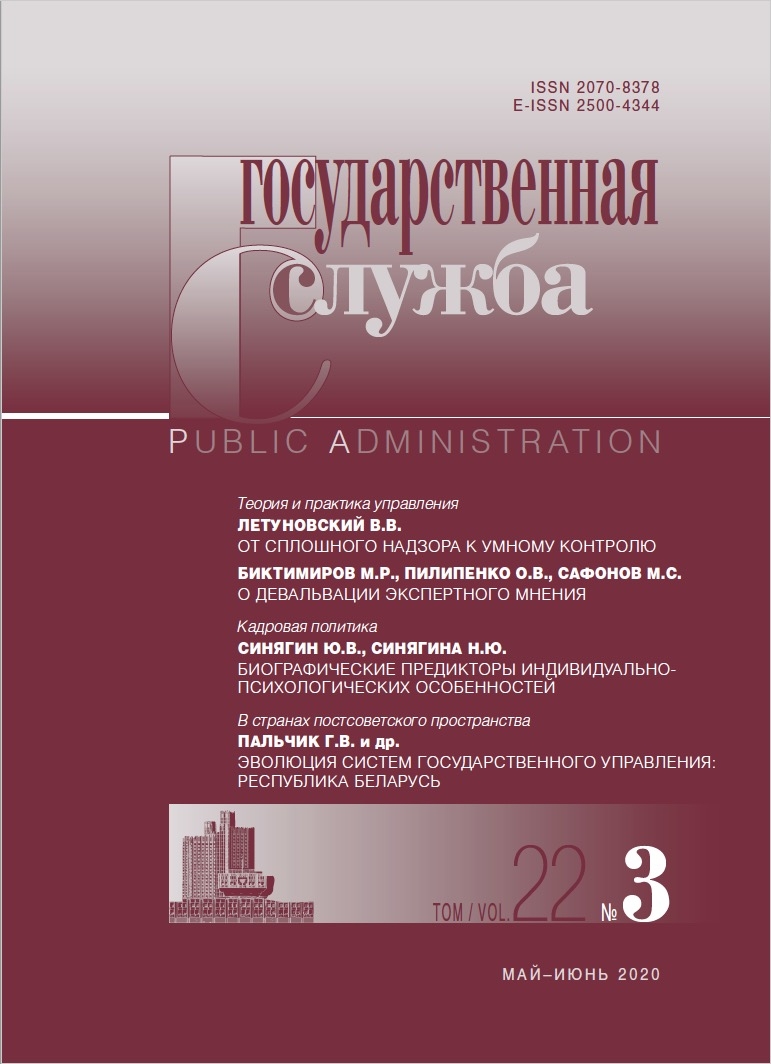Recommended link to article:
MARAT R. BIKTIMIROVа
аAutonomous non-profit organization ‘Institute of digital transformation of education’
OLGA V. PILIPENKOb
bCommittee on Education and Science of the State Duma of the Russian Federation
MAXIM S. SAFONOVc
cRussian Academy of Sciences
DOI: 10.22394/2070-8378-2020-22-3-19-24
Abstract:
Taking practical responsible decisions in the field of social and industrial management in the context of rapid development of digital technologies in the era of the knowledge economy is impossible without reliance on expertise. A kind of organization of activities for the production of ‘predictions’ is required, when not only an accurate assessment of the impact of certain factors and their possible interactions with each other is given, but also as a result of creative construction of scenarios for the development of processes and events, an understanding comes which factors need to be taken into account. At the same time, the expertise constantly faces criticism, calling the conclusions of experts arbitrary, unreliable and subjective. Often, expertise is confused with monitoring, evaluation, diagnosis, inspection or counseling. The authors of the article carried out a structural analysis of the content of the expertise processes in the project management vector in the digitalization era and came to the conclusion that the effectiveness of the expertise is significantly increased in case of clear regulation of this type of activity, providing the necessary status.
Keywords:
analytics, expertise, expert activity, expertology, digital technologies, strategy, legislation, law
Received:
May 17, 2020
References:
Ashkerov A.Y. Expertocracy: knowledge management. Production and circulation of information in the era of ultra-capitalism. M.: Yevropa, 2009. 132 p. In Russian
Bell D. The coming post-industrial society: the experience of social forecasting / trans. from English M.: Academia, 2004. 783 p. In Russian
Martynov A.V. The foggy prospects of the Open Government system in the era of the digital economy of Russia. Zakony Rossii: opyt, analiz, praktika. 2018. № 11. P. 10-23. In Russian
Maruev S., Stefanovskiy D., Troussov A. Semantics of TechnoSocial Spaces. In: Modern Computational Models of Semantic Discovery in Natural Language. Hershey, Pennsylvania, USA: IGI Global. 2015. P. 204–234. In English
Nesterov A.V. Expertise: general theory of expertise. M.: HSE Printing House, 2014. 262 p. In Russian
Nesterov A.V. Theoretical and pragmatic problems of expert analysis. Expert-criminalist. 2011. № 2. P. 33–36. In Russian
Nesterov A.V., Andreeva E.I. Regulations: theory and practice: monograph. M.: Rossiyskaya tamozhennaya akademiya. 2008. 138 p. In Russian
Peirce C.S. Selected philosophical works / trans. from English. M.: Logos, 2000. 411 p. In Russian
Platonov Y.P. Technology of power: in 2 vol. SPb.: Rech, 2010. 576 p. In Russian
Ryzhov V.A. Analytics and expertise in the information society. Ekonomicheskiye strategii. 2018. V. 20. № 2(152). P. 140–155. In Russian
Seleznev N.F. Creation of an institute of independent technical experts is a necessary stage in the development of public administration. Vestnik MGSU. 2017. Vol. 12. № 8(107). P. 931–933. In Russian
Sidelnikov Y.V. Expertology is a new scientific discipline. Avtomatika i telemekhanika. 2000. № 2. P. 107–126. In Russian
Sidelnikov Y.V. Formation of the conceptual and terminological apparatus of expertology. Problemy upravleniya. 2017. № 5. P. 18–30. In Russian
Articles in Open Access mode are published under the Creative Commons Attribution 4.0 International (CC BY) license.

